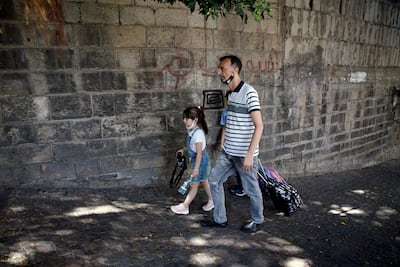Many public school teachers in Lebanon returned to class on Monday after two months on strike, but they will not be teaching afternoon classes to the children of Syrian refugees and contract teachers said they would continue to stay away from work.
Public school teachers will receive an increase in their transportation allowance, with tenured teachers securing a daily transportation allowance of five litres of petrol per day for four days a week, while contract teachers were offered up to five litres per day for three days a week.
Additionally, all public school teachers will receive an additional incentive of US$125 per month worked, paid via money transfer until the end of the school year.
“Of course we are not happy with the results, but between bad and worse, we chose the less bad,” said Teachers Union branch vice president Manal Hdaife. “We’ve partially received the demands we fought for so we will hang up the strike for now while we continue fighting for improved work conditions.”
Ms Hdaife, a school principal, said some contract teachers remained unhappy and were continuing to boycott the reopening of public schools.
Contract teachers called the decision to end the strike a capitulation to the government and staged a protest outside the Education Ministry.
“This is a kilo of onions. This illustrates one hour of our work”, a disgruntled teacher yelled, as she held up a bag of onions. “To everyone who went to work today I want to tell you: you've sold our dignity for a kilo of onions.”
The teachers went on strike in early January to demand that their salaries, paid in Lebanese pounds, be adjusted to compensate for the currency's steep drop against the dollar, which has pushed up prices across the board. They also demanded transport allowances and better healthcare coverage.
Mrs Hdaife’s base salary of just under $100 at the current exchange rate, which fluctuates daily, was increased after another strike last year that prompted the education ministry to triple teachers' base salaries.
She said the ministry's latest concessions will bring her monthly income to up to about $220, which is better than other public school teachers' pay due to her position as a principal but it is still hardly enough to make ends meet.
Public school turmoil

For Ms Hdaife, the decision to return to work was existential.
“Every public institution in Lebanon is bankrupt, while private schools are continuing to teach”, she said. “Our existence has come into question: do we stay and work or do [public schools] cease to exist?”
Pupils at public schools have had to deal with repeated closures as teachers have held strikes over devalued salaries and dire work conditions since Lebanon’s financial collapse began in 2019.
The economic crisis has driven more than 80 per cent of the population into poverty after banks informally imposed capital controls that have locked people out of the full value of their savings.
Salaries are not keeping pace with the rate of inflation.
Teacher strikes have become a biannual routine, with strikes corresponding to the beginnings of school terms in January and September.
The UN's Children's Fund (Unicef) last month sounded an alarm over continued public school closures which “have caused large and persistent damage to children’s learning, mental and physical well-being and safety”.
“When schools close, early marriage increases, sexual exploitation and abuse of children and child labour rise. The impact will be devastating on the future and well-being of children and youth, their families, and Lebanon’s prosperity”, it said.
No classes for children of Syrian refugees
The partial end of the public school strike on Monday only pertains to morning shift classes attended by Lebanese pupils, but not the afternoon classes held for the children of refugees who fled the civil war in neighbouring Syria.
Ms Hdaife said teachers wanted the cash incentive applied for afternoon classes as well.
“Some people teach at one school in the morning and another school in the afternoon. That’s work, and that’s work. They’re two different shifts”, she said.
“You can’t make us work two shifts for the price of one.”


